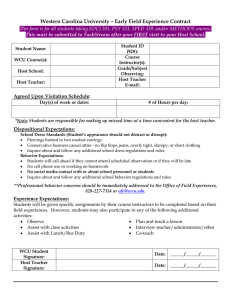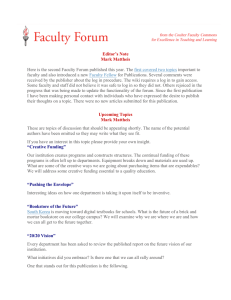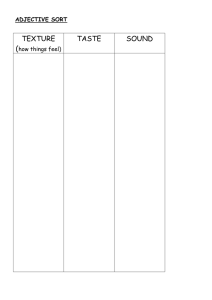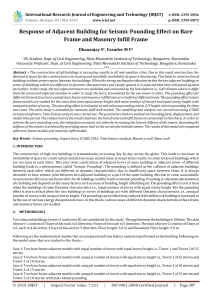Volume 26, Number 6 May 2014 Editor’s Note:
advertisement
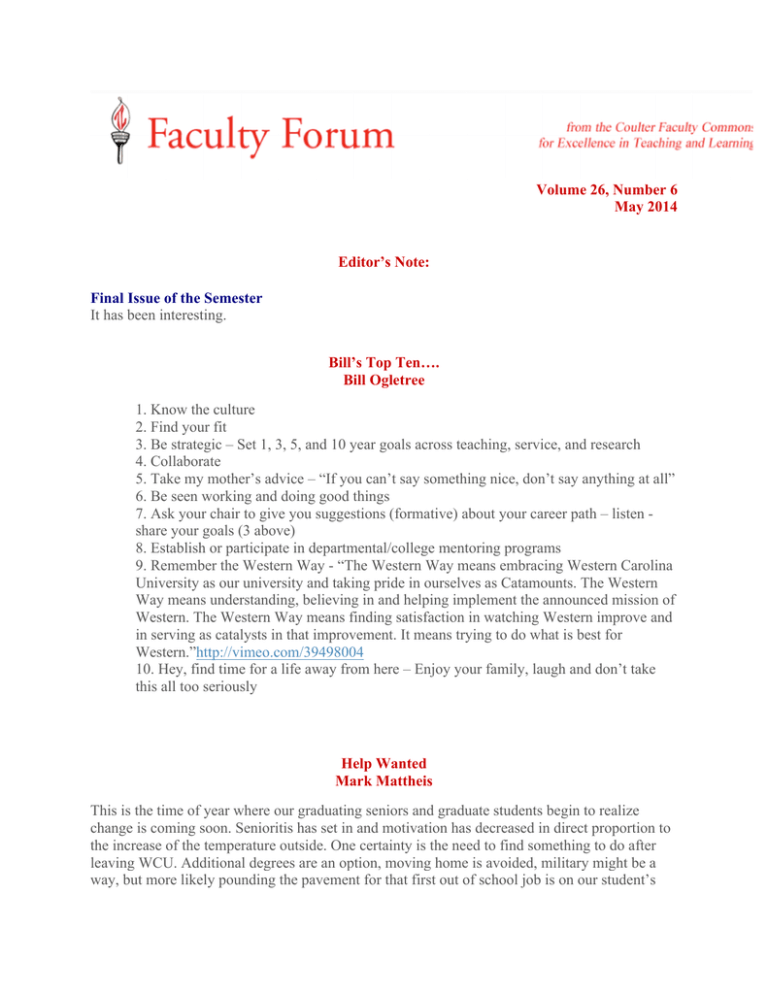
Volume 26, Number 6 May 2014 Editor’s Note: Final Issue of the Semester It has been interesting. Bill’s Top Ten…. Bill Ogletree 1. Know the culture 2. Find your fit 3. Be strategic – Set 1, 3, 5, and 10 year goals across teaching, service, and research 4. Collaborate 5. Take my mother’s advice – “If you can’t say something nice, don’t say anything at all” 6. Be seen working and doing good things 7. Ask your chair to give you suggestions (formative) about your career path – listen share your goals (3 above) 8. Establish or participate in departmental/college mentoring programs 9. Remember the Western Way - “The Western Way means embracing Western Carolina University as our university and taking pride in ourselves as Catamounts. The Western Way means understanding, believing in and helping implement the announced mission of Western. The Western Way means finding satisfaction in watching Western improve and in serving as catalysts in that improvement. It means trying to do what is best for Western.”http://vimeo.com/39498004 10. Hey, find time for a life away from here – Enjoy your family, laugh and don’t take this all too seriously Help Wanted Mark Mattheis This is the time of year where our graduating seniors and graduate students begin to realize change is coming soon. Senioritis has set in and motivation has decreased in direct proportion to the increase of the temperature outside. One certainty is the need to find something to do after leaving WCU. Additional degrees are an option, moving home is avoided, military might be a way, but more likely pounding the pavement for that first out of school job is on our student’s minds. Or should it be said, pounding on the electronic device. Gone are the days of waiting for that one paper issue of the Chronicle that had all of the jobs posted. Gone are also the days of mailing out applications type written on appropriate paper stock so the HR person can feel the quality of our abilities. Modern job-hunting on the surface seems easier than ever. There are apps for that. Just copy and paste your resume and it will populate the specific areas. Create a couple of cover letters and change the appropriate headings, push apply, simple as pie. But the best pie is made from scratch, and so are the skills of the job applicant. Networking is still the key to getting and keeping gainful employment. Facebook is the modern day Rolodex. Being a “friend” does not however translate to fitting in with a workforce. LinkedIn manages more professional acquaintances and having a high Klout.com score shows you are the master of your own online domain. It takes a good deal of time to stay connected and active in the virtual world, but this activity is native to our graduates. The tweets and instagrams provide exposure to those who might sit across a desk one day and ask,” How many followers do you bring to this company?” So it no longer may be true to say, “Its who you know” that matters, but rather “who knows you” in order to get your foot in the door and keep it there. We are in the business of “what you know”. We have spent years getting our students to a level of knowledge that is worthy of their degree. There have been times of heartache and joy, a good deal of frustration and some jubilation. We have imparted what we know and have encouraged our students to understand there is always more to learn. We take pride in their accomplishments and have a great hope for a bright future. When you see a sign that says “Help Wanted” ask yourself if you also taught your students there is more to working than just a check. To “help” is to give assistance or support and to do something that makes it easier for someone to do a job. “Wanted” is the desire to be necessary or needed, and to be needed is essential for a quality life. Good luck to those who are moving on. Your time here has been appreciated. Disclaimer The opinions expressed here belong solely to the authors and do not necessarily represent the opinions of the editorial staff or of the Faculty Commons. If you would like to respond, you may input your comments directly through the wiki on the Faculty Forum webpage, or e-mail your comments to FacultyFellow and they will be posted. For additional information about the Faculty Forum or to submit an article please contact: Mark Mattheis - Faculty Fellow for Publications memattheis@wcu.edu


